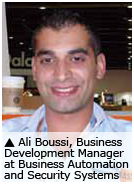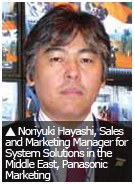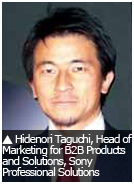Shiny Stars

In the Middle East and Africa, UTCFS products are used in most countries. “Securing the Abraj Al-Bait Towers hotel and the Imam Muhammad ibn Saud Islamic University in Saudi Arabia are two examples,” Timperman said. “Airports like Rafic Hariri International in Beirut and retail spaces such as the Dubai Mall rely on our fire products. Additionally, we offer integrated security solutions for Toyota Plaza in Bahrain and the Amiri Diwan in Qatar, to name a few.”
For Honeywell Security, top markets include Saudi Arabia, Libya, Qatar, Oman, the UAE and Turkey, with the entire region growing at roughly 25 to 30 percent, said Wisam Yaghmour, Regional Sales Director.
Saudi Arabia is likely to remain the biggest market in the region for security equipment and technology for the foreseeable future. Security concerns run very high, not the least because of a series of terrorist attacks some years ago against business infrastructure and residential compounds. Significant efforts and resources have been expended to protect universities, hospitals and critical infrastructure for the production and transportation of oil/gas, according to the US Commercial Service.
The various theme parks under construction, sporting or crowd-drawing events like the FIFA 2022, and high-end establishments that require at least 300 cameras per site will help Bosch grow exponentially in the UAE, Qatar, Kuwait, Oman and Bahrain, Zeissig said.
Even in smaller markets like Jordan and Syria, Milestone is doing much better than in 2009 and early 2010, with strong rapport with the local governments, military forces and police.
Quantum Leaps
 The most noticeable change in the Middle Eastern security landscape is the pace of change. “Three to four years ago, education was severely lacking,” Zeissig recalled. “Now, most of our channel partners can troubleshoot network issues.”
The most noticeable change in the Middle Eastern security landscape is the pace of change. “Three to four years ago, education was severely lacking,” Zeissig recalled. “Now, most of our channel partners can troubleshoot network issues.”
Honeywell has also witnessed something similar. “We only sell to the right integrators that are knowledgeable, IP-savvy and trained,” Yaghmour said. “End users are getting smarter; they know exactly what they want technically. You need to ensure absolutely seamless integration that optimizes your customers' investments and the value adds of your solutions. When your customers have faith in you, orders will keep rolling in from future referrals or projects.”
For manufacturers like Axis, training sessions are held at their academies or offices every month. “Regular hands-on practice makes it easier to converge,” al Akkad said. “While education is one of our strengths, it is also one of our challenges in continuing to drive the shift to and growth in IP. So, we also educate our partners to listen to user and market needs and feed back to the R&D team for more quality and reliable products.”
 There are also niche players that fill in the missing pieces in the IP supply chain — another sign that the market is rapidly approaching maturity. “We specialize in storage and wireless transmission, as well as backhaul support for industrial controls and product testing,” said Aditya Sahaya, Director of Business Development for Prologix Distribution. “With more and more IP-based products and solutions being adopted, we have become the go-to guys in the region; we expect to grow at least 200 percent this year.” Since many decision makers are still analog-minded, Sahaya believes there is plenty of room for analog/IP coexistence and for everyone to grow.
There are also niche players that fill in the missing pieces in the IP supply chain — another sign that the market is rapidly approaching maturity. “We specialize in storage and wireless transmission, as well as backhaul support for industrial controls and product testing,” said Aditya Sahaya, Director of Business Development for Prologix Distribution. “With more and more IP-based products and solutions being adopted, we have become the go-to guys in the region; we expect to grow at least 200 percent this year.” Since many decision makers are still analog-minded, Sahaya believes there is plenty of room for analog/IP coexistence and for everyone to grow.
While it is crucial to stay on top of product development and channel management at all times, William Ku, Director of Brand Business for Vivotek, would like to remind all that it is equally important to remain in touch with your end customers to provide proper project support across the ecosystem for the long haul, as “total buy-in.” Sahaya added that long-term support, financial soundness, reference/experience, geographical spread and commitment are also important qualities that set players of different calibers apart.
The Middle East is brimmed with opportunities and surprises. While the market dynamics and channel structure are not like the wild wild “east,” the region does demand every ounce of strength and dedication even from the best. What follows is how four multinational system integrators see the regional market and share their insights: Johnson Controls, Schneider Electronic, Siemens Building Technologies and UTC Fire & Security.